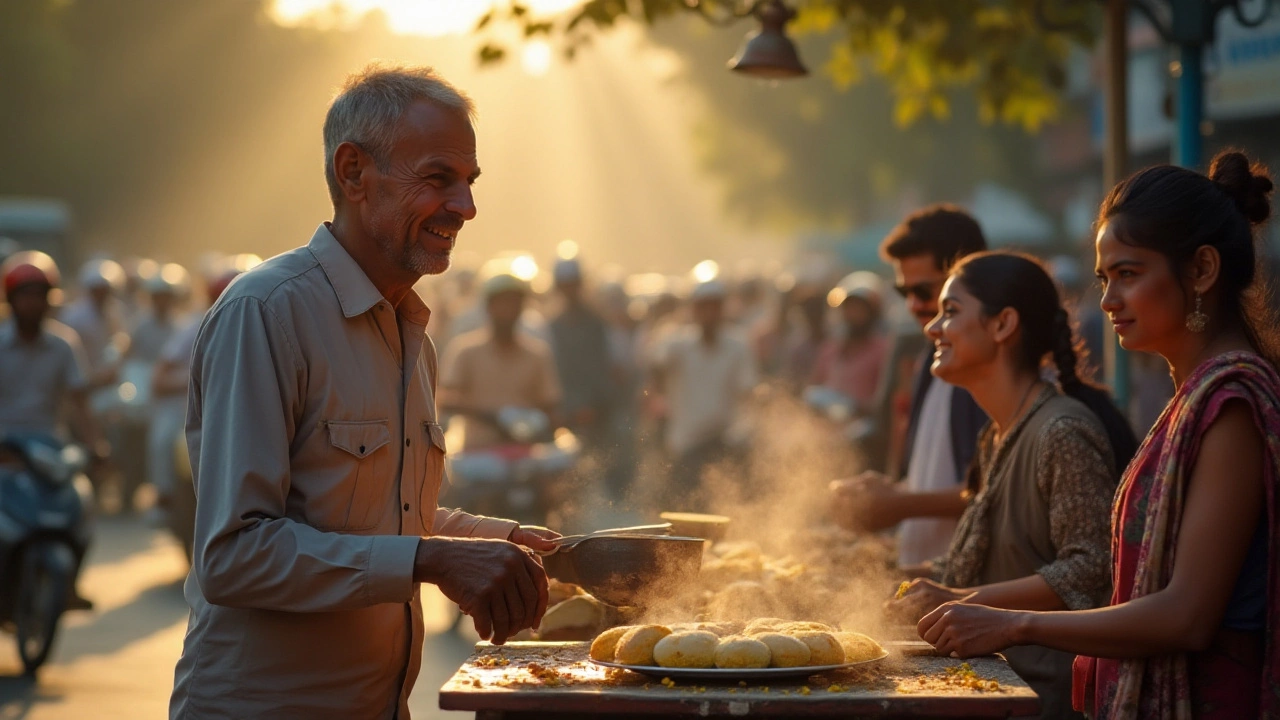When considering breakfast in India, one is immediately struck by the incredible diversity that mirrors the country's tapestry of cultures and culinary traditions. Breakfast is not a mere morning ritual but a celebration of flavors, textures, and aromas that vary widely from north to south, east to west.
Most Indians typically have breakfast between 7 AM and 10 AM, with regional variations influencing the timing and type of food consumed. For instance, in the bustling cities like Mumbai and Delhi, people often grab quick bites before heading to work or school.
With the modern lifestyle becoming increasingly fast-paced, one might wonder how to reconcile tradition with convenience. Fear not, for there exists a myriad of quick yet wholesome breakfast ideas that can cater to everyone’s taste while ensuring they start their day on a nutritious note.
- Traditional Breakfast Timings in India
- Popular Indian Breakfast Dishes
- Quick Breakfast Ideas for Busy Mornings
- Health Benefits of Eating Breakfast
- Tips for a Balanced Morning Meal
Traditional Breakfast Timings in India
In India, breakfast is not just the first meal of the day; it represents a deeper connection to the rhythm of daily life and regional customs. While the country is vast and diverse, a common thread that unites many Indians is their affinity for a hearty morning meal. Generally, the timing for enjoying breakfast in India varies widely across regions due to different climatic conditions and lifestyle habits. Typically, breakfast is consumed between 7 AM and 10 AM. This timeframe aligns with the early start of the workday in both rural and urban settings, where people often have long commutes or the day's work begins at sunrise.
In northern India, cities like Delhi and Lucknow, where the summers are fierce and the winters are chilly, people often start the day early with dishes like parathas and chole bhature. These meals are typically hearty, providing the energy needed for the day ahead. In contrast, southern India embraces idlis and dosas, served with chutney and sambar, as staple breakfast dishes, typically eaten around 8 AM in the pleasant morning air before the heat peaks. The preparation of these meals often begins much earlier, around 6 AM, as families rise with the sun.
In the east, particularly in West Bengal, breakfast might consist of luchis or rice-based dishes, reflecting the local grain's prevalence, usually shared in a more leisurely manner at around 8:30 AM. The western parts of India, like Gujarat and Maharashtra, often feature lighter meals such as poha and thepla, enjoyed at various times but typically completed by 9 AM to accommodate work schedules. As India continues to modernize, there has been a noticeable shift in breakfast timing and content, especially in urban centers where work starts earlier and travel times are longer.
To accommodate this shifting lifestyle, many families have adapted by preparing breakfasts the night before or turning to quicker options that still honor traditional flavors. Despite these changes, breakfast remains a sacred family time in many homes. According to a survey conducted in various Indian metros, 72% of families still consider breakfast a crucial time for bonding. They try to adhere to traditional timings as much as possible, respecting the cultural essence attached to this meal.
As renowned food historian K. T. Achaya wonderfully noted, “The significance of breakfast in India is not just in nourishment but in its ability to bring families closer together, reflecting the very soul of our shared culinary heritage.”
Popular Indian Breakfast Dishes
In India, breakfast is as much a sensory delight as it is a necessity to kick-start the day. Each region showcases unique ingredients, flavors, and techniques that have been passed down through generations. Whether you're savoring the street-side delights or replicating recipes at home, it's easy to get mesmerized by the diversity. Let's delve into the exquisite world of traditional Indian breakfasts that have captured hearts across the globe.
One cannot discuss Indian breakfasts without mentioning the beloved idli and dosa. These South Indian staples have become a household name, not just in their native region but throughout the country. Idli, a soft rice and lentil cake, is not only light on the stomach but also a source of carbohydrate goodness. The dosa, on the other hand, is a crispy pancake with the same batter, often served with sambar and coconut chutney. Whether you're a fan of rich and spicy accompaniments or prefer a tangy tomato chutney, idli and dosa offer versatility that can cater to various palates. Many find comfort in their consistent warmth and delightful texture, making them a favorite among Indian households.
For those who prefer something more savory and filling, the North Indian Aloo Paratha is a must-try. Loved by many for its indulgence, this stuffed bread is prepared with whole wheat flour and filled with spiced potatoes. Cooking involves roasting on a tava, generously adding ghee or butter for that golden crust! Served with curd or tangy pickles, Aloo Paratha can be as mild or as spicy as desired, and it never fails to satisfy a robust morning appetite.
"Breakfast is the most important meal of the day," says renowned Indian Chef Sanjeev Kapoor. "A traditional dish like Aloo Paratha not only keeps you full but also offers the rich taste of India's culinary heritage."
Moreover, in western states like Maharashtra, Poha is much-loved for its simplicity. Made from flattened rice, this seasoned dish includes onions, potatoes, mustard seeds, and green chilies. Garnished with coriander leaves and sprinkles of lime juice, Poha is not just light and healthy but also quick to prepare. In Gujarat, a similar dish called Khaman Dhokla also enjoys popularity. Prepared from fermented chickpea batter, these fluffy squares are steamed to perfection and offer a tangy, sweet, and spicy taste all in one bite. A staple in many households, these dishes are perfect for those bustling mornings.
Moving to the eastern part of India, Panta Bhat or Pakhala, a rice-based fermented dish, holds a special place in Bengali households. It's typically consumed cold, often seasoned with salt, green chilies, and sometimes even raw onions. Such meals not only reflect local dietary customs but also nurture the body and soul—especially cherished by those living in India’s hotter regions for its cooling properties.
As breakfast continues to evolve, one can’t ignore the modern adaptations that have made the cut. Whether it's a quick sandwich or a bowl of oats prepared Indian-style with spices, the options are endless. The beauty of Indian breakfasts lies in their adaptability, easy transformations, and how people integrate these dishes into their daily routines, maintaining both tradition and taste.

Quick Breakfast Ideas for Busy Mornings
In today's hectic lifestyle, finding time to whip up a traditional Indian breakfast can be challenging, yet skipping breakfast isn't an option. Nutritionists have long emphasized the importance of breakfast, calling it the most important meal of the day. After all, it replenishes your body's energy supply after a night of fasting. For those leading a busy life, there are numerous quick breakfast ideas that are both nutritious and delicious, allowing you to zip through your morning routine without fuss. Imagine the aroma of freshly toasted bread mingled with the spicy tang of chutney, a classic Bombay sandwich that doesn't just fill your stomach but also tantalizes your taste buds.
One of the cornerstones of a quick breakfast in India is the versatile poha, a fluffy and light dish made from flattened rice. Poha is not just quick to prepare but also packed with flavors that instantly brighten your mornings. Garnish it with a fistful of peanuts and freshly grated coconut, and you’ve got yourself a wholesome breakfast in under 15 minutes. Another favorite among young professionals is the humble upma, a savory porridge made from semolina. It's swift to cook and can be spruced up with vegetables like peas and carrots, turning it into a mini fiesta of colors on your plate.
If you're prone to skipping breakfast because of time constraints, smoothies can be a delightful and practical solution. Toss a handful of spinach, a banana, and some milk into a blender, and voilà, you’ve got a nutrient-rich beverage ready in no time. Not only are smoothies easy to make, but they also allow you to incorporate a plethora of fruits and veggies into your morning diet, providing you with the necessary vitamins to kickstart your day. A sprinkle of chia seeds can elevate your smoothie game, offering an additional dose of fiber and omega-3 fatty acids. Consider it liquid gold made within minutes.
A popular on-the-go option is the egg sandwich. Boil a couple of eggs while you're getting ready, slice them up and place them between two pieces of bread, along with a dash of salt, pepper, and perhaps some fresh coriander. It's a filling and delicious breakfast option that you can literally eat while running to catch the bus. For those who can't imagine starting their day without something sweet, there’s always the option of overnight oats. Prepare these the night before by soaking oats in milk or yogurt mixed with some honey and a chopped apple. Come morning, you'll have a delightful pudding-like treat waiting in the fridge.
Exploring regional options, an instant dosa mix can be a lifesaver on rushed mornings. Dosas are crepes made from rice and lentil batter, typically served with chutney and sambar. While preparing a traditional dosa batter can be time-consuming, pre-made mixes allow you to have this delicious south Indian fare ready in minutes. Pair it with a quick coconut chutney prepared by blending fresh coconut, green chilies, and salt, and you’ve got a breakfast that’s both authentic and expedient. As an option for those away from home, ready-to-eat packaged parathas that can be swiftly warmed on a skillet offer a slice of familiarity with minimal effort.
Health Benefits of Eating Breakfast
Starting the day with a nutritious breakfast is not merely an old wife's tale; it is a scientifically supported cornerstone for a healthy lifestyle. The morning meal, especially in a diverse country like India, lays the foundation for the day. Consuming a well-balanced breakfast between 7 AM and 10 AM can significantly impact mental and physical well-being. Breakfast helps kick-start the metabolism, sending a signal to the body to begin burning calories, which helps maintain or achieve a healthy weight. When you break the overnight fast, your insulin levels stabilize, offering you sustained energy to handle the demands of the early hours. Missing breakfast can mean missing out on these essential nutrients, keeping you low on energy and making it challenging to concentrate or to perform well either at work or learning environments.
Besides immediate energy, breakfast is often the best time to boost your intake of vital nutrients such as dietary fiber, vitamins, and minerals. For instance, a traditional South Indian breakfast with idlis and sambhar packs a punch with protein and fiber, while a bowl of fresh fruits and yogurt boosts your intake of essential vitamins. The simple act of having a morning meal also helps maintain a healthy cholesterol level and reduces the risk of heart disease. In a study published in the Journal of the American College of Cardiology, researchers found a link between skipping breakfast and an elevated risk for coronary artery disease. As you sip your morning chai or coffee, consider the numerous benefits you're gaining beyond just a breakfast's flavor.
For children and adolescents, the importance of eating a nutritious breakfast cannot be overstated. A consistent morning meal is linked to improved school performance, better concentration, and more positive behavior. Adults as well benefit from having more controlled blood sugar levels, which reduces hunger during the day, making it less likely to reach for unhealthy snacks before lunch. Dr. Ranjana Singh, a renowned nutritionist, emphasizes,
"Breakfast is the most vital meal that can shape your day's nutritional intake and sets the tone for healthy eating throughout the rest of the meals."Remember, balance is key. Incorporating foods rich in carbohydrates and fiber, such as whole grains or *poha*, will ensure you have a steady release of energy till your next meal.
Moreover, a survey from the Indian Dietetic Association revealed that people who consume breakfast regularly have a lower incidence of lifestyle disorders like obesity and type 2 diabetes. Your morning meal doesn't just nourish the body; it nurtures mental health too. Studies have shown correlations between regular breakfast consumption and lower levels of stress or depression. Imagine starting your day with a vibrant bowl of *upma* or spicy *chole bhature*, and the satisfaction that such a meal can bring. Finally, making time for a family breakfast, though it might seem challenging, creates an opportunity to bond—a valuable yet often overlooked benefit of the morning meal. These shared moments even become cherished memories in the hustle and bustle of everyday life, contributing to emotional and social nourishment as much as they do nutritional well-being.

Tips for a Balanced Morning Meal
A balanced morning meal is foundational to a healthy day, offering both the nutrition required for energy and the mental clarity to tackle daily tasks. Eating a well-rounded breakfast can help regulate your metabolism and prevent mid-morning fatigue. A mix of macronutrients is essential. Start by including complex carbohydrates, such as whole grains, which supply sustained energy. Proteins, found in eggs or legumes like chickpeas, aid in muscle repair and satiety. Adding a colorful array of fruits or veggies will ensure you get vital vitamins and minerals necessary for overall well-being.
One crucial tip is to personalize your Indian breakfast to fit your specific needs. Different people have varying dietary requirements, so it’s important to consider any specific health goals or restrictions. For example, if you’re trying to manage weight, opting for fewer sugars and healthy fats could make a difference. If building muscle is a priority, a more protein-intensive option might be beneficial.
Portion sizes should not be overlooked. While it’s important to incorporate all essential food groups, keeping portions balanced is key to avoiding excessive calorie intake. Start with a smaller portion and give your body time to recognize satiety signals. This approach can significantly reduce the likelihood of overeating and help maintain a stable weight in the long run.
According to a study published in the Journal of Nutrition, "Balanced breakfasts that include protein have a significant impact on appetite control and nutrient choice throughout the day."
Hydration is equally essential and often underrated. Begin your day with a glass of water or a refreshing herbal tea. Staying hydrated can boost your metabolism and reduce the urge for unnecessary snacking. Keeping caffeine consumption moderate is advisable as it may sometimes lead to increased appetite or anxiety if overdone.
An optimal breakfast should also consider the speed with which it can be prepared. Many working professionals and students find themselves in a hurry in the morning. Quick breakfasts like poha or smoothies, which can be assembled the night before, are excellent options. Taking a little time to plan your meals can ensure you start your day with the right fuel, even on busy mornings. Combining these strategies can help you cultivate a morning routine that is both nutritious and aligned with your lifestyle.
